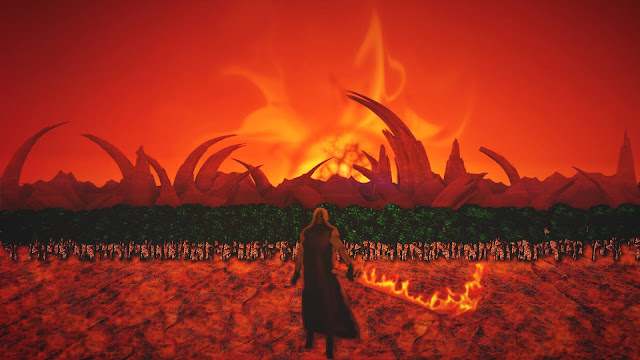The Storytelling of Empyrean (part 1)
In the following posts I will attempt to establish my approach to Storytelling / Narrative gameplay, explore the character of story-based games, and explain how Empyrean RPG tackles these things.
As we've discussed elsewhere Empyrean is a storytelling game. I would have even dared to use the "Narrative" term if it wasn't for the system having many elements that aren't strictly narrativist.
I will try to expand on my thoughts about Narrative Games here.
I don't believe some form of purism truly applies in these concepts, merely a measure by comparison. Ultimately all systems are coupled to the concept and world that they are used in, whilst "generic" systems tend to build "generic" worlds and may lead to a forgettable exploration (although ultimately the idea of the story overwhelms poor game mechanics, in my opinion).
To the endless frustration of the patient and progressive people that were willing to put up with my maverick designs, I've experimented with many different design elements.
The ultimate feedback I always got whenever I tried to inroduce "pure" narrativist elements into game play, was that the players felt too constrained by these elements, and often felt like not having the freedom to be allowed to play what I like to call "tactical" play.
The gist of things was that we had different approaches to game play. My dream (and endless frustration) was to introduce a game where the players were allowed maximum freedom to explore the emotional world of their characters, through strong passions. As with all forms of freedom, this type of freedom required the player to commit to play their character consistently, even making tactically unsound choices. But the first problem is that nobody likes to lose, and the second problem is that perhaps winning and losing should not be involved at all with storytelling.
So of course the players had a different approach. Sure, they loved to actively participate in stories, but they also loved the sense of achievement of overcoming difficulties, the ability to tactically overcome strategically complex situations, and, of course, the ability to solve mysteries and puzzles.
Ultimately, not all people will sit around the table with the same agenda, but we somehow have to remain consistent to our design but also engage everyone who sits at the table.
This has changed my approach to storytelling, so that I begin by trying to realize that everyone who sits at the table, is here to participate in the story, REGARDLESS of their preferred gaming mode. So my declaration of intent is a storytelling experience, but I strongly believe in trying to engage all types of players to participate in the storytelling at their own pace. Of course, I assume people who simply don't care about storytelling will ultimately gravitate towards other forms of games.
So, in my opinion, a storytelling / narrativist game has an overarching story-based system, which will be immediately visible. Sure, you can overcome difficulties, and make a lot of important achievements, sure you have tactical and strategic use of the system, and sure you will be solving puzzles, but the main focus is to uniquely color your character's action within that context. To actively participate in the ongoing storytelling.
To really nail it down I think a storytelling game has the following basic traits:
- The narrative is dynamic and dramatic. It isn't a fixed scenario or a script, but a more "organic" structure that branches out and moves between certain broad themes, that correlate to the characters.
- The players' choices affect the storyline in a dramatic manner. The narrative is centered on the players, although they aren't necessarily the protagonists of the overall story.
- Players shape consistent and unique characters who become an integral part of the story through their actions and choices.
- A story with powerful dynamic dramatic elements and mechanics is already ongoing. The players interact with the story in meaningful ways. They have to make tough calls that don't have a right or wrong answer.
- Character and story development are both non-linear and co-dependent.
- Relations with NPCs are diverse and complex.
- Story drives the game and utilizes the mechanics, the mechanics never get in the way of storytelling.




Comments
Post a Comment